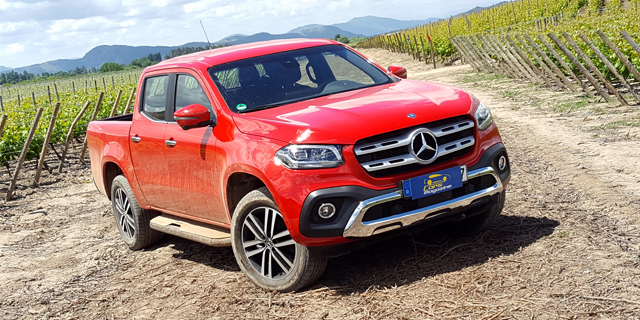

Cuando CarsMagazine.com.ar probó la Mercedes-Benz Clase X en octubre de 2017 en Santiago de Chile (ver aquí), nadie imaginaba la noticia que acaba de confirmarse oficialmente: la cancelación del proyecto de producir la nueva pickup mediana en la Argentina. En ese entonces, estaba prevista su fabricación desde fines de 2018, en la planta Santa Isabel de Córdoba -junto con sus “primas” la Nissan Frontier y Renault Alaskan- con el objetivo en mente de lanzarla comercialmente durante el primer semestre de 2019.
La noticia oficial llegó hoy, viernes 26/4, directamente desde Stuttgart, Alemania, a través de un comunicado de sus resultados financieros emitido por Daimler AG. En uno de los párrafos sostiene que “después de revisar el caso de negocios y en alineación con el socio colaborador, se decidió no producir la Mercedes-Benz Clase X en la Argentina. Además, las ganancias se vieron afectadas por los gastos iniciales de nuevas tecnologías, los costos de lanzamiento de nuevos productos, los efectos del tipo de cambio y los gastos por garantías y la buena voluntad de los clientes”.
La producción de la Clase X en la Argentina estaba enmarcada en un proyecto industrial conjunto de Renault, Nissan y Daimler, con una inversión de 600 millones de dólares, en la fábrica de Santa Isabel en Córdoba. El proyecto contemplaba la producción de la pickup Nissan Frontier, ya a la venta; de la Renault Alaskan, que espera el segundo turno de fabricación pero sin fecha definida (ver aquí); y por último, de la Mercedes-Benz Clase X, agendada con el tercer turno y ahora, oficialmente cancelada.
A continuación, el comunicado de prensa original en inglés, a la espera de una comunicación oficial de Mercedes-Benz Argentina…
COMUNICADO DE PRENSA – DAIMLER AG
Daimler affirms 2019 targets for unit sales, revenue and earnings
- First-quarter Group unit sales down 4% to 773,800 units
- Revenue stable at €39.7 billion (Q1 2018: €39.8 billion)
- Group EBIT significantly lower at €2.8 billion (Q1 2018: €3.3 billion)
- Slight decrease in net profit to €2.1 billion (Q1 2018: €2.4 billion)
- Free cash flow of industrial business of minus €2.0 billion mainly due to higher inventories (Q1 2018: plus €1.8 billion)
- Outlook for 2019: slight growth in unit sales, revenue and earnings still expected
- Dr. Dieter Zetsche, Chairman of the Board of Management of Daimler AG and Head of Mercedes-Benz Cars: “We cannot and will not be satisfied with this – as expected – moderate start to the year. We now have to work hard to achieve our targets for 2019. Based on our sales planning and the countermeasures we have already initiated, we are confident that we will achieve those targets. In the first few months of this year, we have consistently implemented further elements of our strategy and initiated several important projects: our cooperation at smart with Geely, the development of a joint platform for autonomous driving, and the merger of the mobility services with those of the BMW Group.”
- Bodo Uebber, Member of the Board of Management of Daimler AG responsible for Finance & Controlling and Daimler Financial Services: “We had a comparatively weak start to the year and face numerous challenges along the entire value chain in all our automotive divisions. This had a negative impact on unit sales and earnings. Above all, high inventories and bottlenecks in the supply chain had a substantial negative impact on the cash flow. Nonetheless, we will continue to invest in our future – sensibly and with a clear focus.”
Stuttgart – Daimler AG (ticker symbol DAI) started the year in a challenging economic environment with stable revenue and moderate earnings in the first quarter. The Group’s total unit sales decreased by 4% to 773,800 passenger cars and commercial vehicles. Revenue amounted to €39.7 billion (Q1 2018: €39.8 billion). Also adjusted for positive exchange-rate changes, revenue remained at the prior-year level.
The Daimler Group achieved first-quarter EBIT of €2,802 million, well below the prior-year figure of €3,335 million. Net profit weakened only slightly to €2,149 million (Q1 2018: €2,354 million). Net profit attributable to the shareholders of Daimler AG amounted to €2,095 million (Q1 2018: €2,273 million), leading to a decline in earnings per share to €1.96 (Q1 2018: €2.12).
Earnings at all the automotive divisions decreased significantly compared with the first quarter of last year, while Daimler Financial Services benefited from a positive valuation effect. Earnings at Mercedes-Benz Cars were lower than in the prior-year quarter, due in particular to lower unit sales and changes in the sales structure. There was a negative impact on earnings at Daimler Trucks from additional costs, mainly resulting from higher raw-material prices and supply-chain bottlenecks. Mercedes-Benz Vans and Daimler Buses posted negative earnings. At the van division, expenses in connection with the adjustment of production capacities as well as upfront expenditure for new technologies and products resulted in a loss for the period. At Daimler Buses, delivery delays due to a changed internal certification process for coaches and intercity buses had a negative impact. On the other hand, Daimler Financial Services’ EBIT increased substantially in the first quarter. This was mainly due to the merger of the mobility services of Daimler and the BMW Group, which had a positive effect on earnings of €718 million.
“We cannot and will not be satisfied with this – as expected – moderate start to the year. We now have to work hard to achieve our targets for 2019. Based on our sales planning and the countermeasures we have already initiated, we are confident that we will achieve those targets. In the first few months of this year, we have consistently implemented further elements of our strategy and initiated several important projects: our cooperation at smart with Geely, the development of a joint platform for autonomous driving, and the merger of the mobility services with those of the BMW Group,” said Dr. Dieter Zetsche, Chairman of the Board of Management of Daimler AG and Head of Mercedes-Benz Cars.
Free cash flow and liquidity
The free cash flow of the industrial business resulted in a cash outflow of €2.0 billion in the first quarter of this year (Q1 2018: cash inflow of €1.8 billion). The sharp decrease resulted in particular from higher inventories, especially at Mercedes-Benz Cars as a result of model changes, as well as lower unit sales due to general market developments and constraints on vehicle availability in some international markets. In addition, the development of trade
payables had a negative impact on working capital, especially at Daimler Trucks. In the Group investments in property, plant and equipment increased.
The net liquidity of the industrial business decreased by €3.2 billion to €13.1 billion at January 1, 2019. This was caused by the introduction of lessee accounting in accordance with IFRS 16 and the associated recognition and measurement of lease liabilities for outstanding rental payments. The net liquidity of the industrial business then decreased by a further €1.7 billion to €11.3 billion in the first three months of the year. The main reason for this was the negative free cash flow of the industrial business.
“We had a comparatively weak start to the year and face numerous challenges along the entire value chain in all our automotive divisions. This had a negative impact on unit sales and earnings. Above all, high inventories and bottlenecks in the supply chain had a substantial negative impact on the cash flow. Nonetheless, we will continue to invest in our future – sensibly and with a clear focus,” said Bodo Uebber, Member of the Board of Management of Daimler AG responsible for Finance & Controlling and Daimler Financial Services.
The workforce
At the end of the first quarter, the Daimler Group employed 299,956 people worldwide (year-end 2018: 298,683, Q1 2018: 294,029). Of that total, 174,368 people worked in Germany (year-end 2018: 174,663, Q1 2018: 173,882), 26,444 in the United States (year-end 2018: 26,310, Q1 2018: 24,426), 10,766 in Brazil (year-end 2018: 10,307, Q1 2018: 10,027) and 9,902 in Japan (year-end 2018: 9,918; Q1 2018: 9,898). The consolidated subsidiaries in China employed 4,442 people at the end of March (year-end 2018: 4,424, Q1 2018: 4,150).
Details of the divisions
Mercedes-Benz Cars sold 555,300 vehicles in the first quarter, which is 7% less than the high number sold in Q1 2018. Reasons for the decrease in unit sales include the general market development, model changes, constraints on vehicle availability in some international markets and intense competition.
In Europe, unit sales were down by 4% to 235,300 Mercedes-Benz and smart brand vehicles. Of that total, 78,100 units were sold in the German domestic market, representing a decrease of 1%. In China, Mercedes-Benz Cars’ largest market, unit sales decreased by 3% to 173,200 units. Sales in the United States fell by 9% to 64,300 units. On the other hand, sales of compact cars developed very positively due to the model change initiated in the spring of 2018 with the new A-Class: Sales of the A-Class, B-Class, CLA and CLA Shooting Brake rose by 11% to 108,800 units, setting a record for a first quarter. At 178,600 units, sales of SUVs were 16% below the level of the prior-year period. Nonetheless, in the first three months of the year, every third Mercedes-Benz automobile sold was an SUV. The G-Class recorded a 53% increase in unit sales in the first quarter, its highest first quarter sales volume.
Mercedes-Benz Cars’ revenue fell by 8% to €21,200 million (Q1 2018: €22,998 million) and its EBIT amounted to €1,298 million (Q1 2018: €2,060 million). At 6.1%, return on sales was below the figure of 9.0% in the prior-year quarter. Earnings were adversely affected by lower unit sales and changes in the sales structure. In addition, EBIT was reduced by weaker pricing, exchange-rate effects and upfront expenditure for new technologies and vehicles.
Daimler Trucks increased its unit sales by 2% to 115,900 vehicles in the first quarter (Q1 2018: 113,800). In the NAFTA region, sales rose by 17% to 47,800 units (Q1 2018: 40,800). In Brazil, Daimler Trucks achieved growth of 51% with 6,100 vehicles sold. With a market share of 30.5% in the medium- and heavy-duty segment (Q1 2018: 29.4%), the division achieved market leadership there. In the EU30 region (European Union, Switzerland and Norway), sales rose by 10% to 19,000 trucks (Q1 2018: 17,300). In Germany, 6,600 trucks were sold, also significantly more than in the same period of last year (Q1 2018: 6,100). Sales in Turkey continued to be severely affected by the country’s considerable economic uncertainty and fell to 500 vehicles (Q1 2018: 1,800). In Asia, sales declined to 34,300 units (Q1 2018: 37,700). Sales of Auman trucks from the BFDA joint venture in China fell to 22,700 units (Q1 2018: 24,000).
Revenue increased by 11% to €9,546 million (Q1 2018: €8,619 million). EBIT amounted to €582 million (Q1 2018: €647 million) and return on sales was 6.1% (Q1 2018: 7.5%). In addition to the increase in unit sales, especially in the NAFTA region, exchange-rate effects had a positive impact on earnings. Higher expenses for upfront expenditure for new technologies and vehicles as well as additional costs, mainly resulting from higher raw-material prices and supply-chain bottlenecks, had a negative impact on EBIT. Earnings were further reduced by the remeasurement of provisions.
Mercedes-Benz Vans increased its unit sales by 4% in the first quarter to 97,000 vehicles, its strongest first quarter to date. In the EU30 region, sales rose by 10% to the record level of 66,600 units (Q1 2018: 60,400). In the NAFTA region, sales of 11,700 units were slightly higher than in Q1 2018 with 11,300 units. Sales in Latin America rose by 9% to 4,200 units (Q1 2018: 3,800). However, sales in China decreased by 6% to 6,100 units. Sales in Russia, and in a difficult market environment in Turkey, were also significantly lower than in Q1 2018.
Revenue rose by 9% to €3,369 million as a result of higher unit sales (Q1 2018: €3,098 million). EBIT amounted to minus €98 million (Q1 2018: plus €172 million) while return on sales fell to minus 2.9% (Q1 2018: plus 5.6%). EBIT was affected by expenses in connection with the adjustment of production capacities in Russia and Argentina. After reviewing the business case and in alignment with the cooperating partner, it was decided not to produce the Mercedes-Benz X-Class in Argentina. In addition, earnings were impacted by upfront expenditure for new technologies, launch costs for new products, exchange-rate effects and expenses for warranties and customer goodwill. Ongoing governmental proceedings and measures taken for diesel vehicles also had a negative impact on earnings.
Daimler Buses’ sales decreased by 4% to 5,500 units in the first quarter. This was primarily due to delivery delays caused by a changed internal certification process for coaches and intercity buses. In the EU30 region, unit sales fell by 33% to 900 complete buses and bus chassis of the Mercedes-Benz and Setra brands. In Germany, sales fell from 400 to 300 units, which will be catch up in the course of this year. Sales in the Brazilian market developed positively with an increase of 20% to 2,200 units. Due in particular to the ongoing difficult economic situation in Argentina, Daimler Buses’ sales in Latin America (excluding Mexico) increased by only 2% to 3,200 chassis. In Mexico, the division recorded a substantial decline to sales of 400 units in the first quarter of 2019 (Q1 2018: 500).
At €785 million, revenue was 8% lower than in the first quarter of last year (€850 million). EBIT amounted to minus €21 million (Q1 2018: plus €37 million) and return on sales fell to minus 2.7% (Q1 2018: plus 4.4%). The decline in earnings was mainly the result of delivery delays caused by a changed internal certification process for coaches and intercity buses.
At Daimler Financial Services, new business decreased by 3% to €17.3 billion in the first quarter due to lower vehicle sales at the Group compared with the prior-year period. At the end of March, Daimler Financial Services’ portfolio comprised 5.3 million vehicles, representing a contract volume of €157.4 billion, an increase of 2% compared with the end of 2018. The insurance business also developed positively, with 539,000 insurance contracts concluded worldwide through Daimler Financial Services in the first quarter (Q1 2018: 523,000).
The division’s EBIT amounted to €1,209 million (Q1 2018: €548 million). At 35.7%, return on equity was above the figure of 17.9% in the prior-year period. The main reason for this was the merger of the mobility services of the Daimler Group and the BMW Group, which had a positive effect on earnings of €718 million. Further positive effects resulted from the increased contract volume. Earnings were reduced by rising credit-risk costs in some markets and by higher interest rates.
Daimler AG and the BMW Group have merged their mobility services and established a network of five joint ventures. The transaction was closed on January 31, 2019 and includes the five joint ventures REACH NOW (a platform for on-demand mobility and multimodality), CHARGE NOW (battery charging), FREE NOW (ride hailing), PARK NOW (parking) and SHARE NOW (car sharing). The BMW Group and Daimler AG each hold equal stakes in the individual joint ventures. The mobility offerings of BMW and Daimler have built up a strong customer base since they were established and currently have around 66 million customers.
“By merging our joint mobility services with those of the BMW Group, we have created a very good basis in the growth market of urban mobility. The merger has had a positive effect on earnings. This reflects the strong increase in the value of our mobility services, from which we are now profiting as a pioneer of station-independent car sharing with car2go. We will continue to invest in promising business models in the future. Efficiency and sustainable profitability are essential for this,” stated Uebber.
The reconciliation of the divisions’ earnings to Group EBIT comprises gains and losses at the corporate level and the effects on earnings of eliminating intragroup transactions between the divisions. Items at the corporate level resulted in expenses of €215 million (Q1 2018: €119 million). The elimination of intragroup transactions resulted in income of €47 million in the first quarter of 2019 (Q1 2018: expense of €10 million).
Investing in the future
In the first quarter of 2019, €1.7 billion was invested worldwide in new products and technologies, capacity expansion and modernization, primarily at the production and assembly plants (Q1 2018: €1.3 billion). The plants in Germany accounted for €1.2 billion of the investment in property, plant and equipment (Q1 2018: €1.1 billion). Research and development spending increased to €2.4 billion (Q1 2018: €2.3 billion).
Outlook for the divisions
Based on the assumptions for the development of the markets important for Daimler and the current assessments of the divisions, the Group anticipates a slight increase in total unit sales in 2019.
Mercedes-Benz Cars expects a slight increase in unit sales in full-year 2019. The sales development will be significantly influenced by lifecycle effects of certain model series. Mercedes-Benz intends to launch more than a dozen new and upgraded vehicles in 2019. The new compact cars in particular, including the new B-Class, the A-Class sedan and the new GLB, the eighth model in the compact-car segment, should have a positive impact on unit sales. Sales are expected to be boosted also by the high-growth SUV segment, especially in the second half of the year.
Daimler Trucks anticipates a slight increase in unit sales in 2019 compared with 2018. In both the NAFTA region and the EU30 region, the division expects a slight increase in unit sales compared with last year. Unit sales in Japan should be roughly at the prior-year level. In Brazil, sales are expected to significantly exceed the low level of 2018. Unit sales in India should be higher than last year. Daimler Trucks expects unit sales in Turkey to decline significantly in view of ongoing considerable economic uncertainty in that market. Lower unit sales are expected also in Indonesia.
Mercedes-Benz Vans now plans for a slight increase in unit sales in 2019. In addition to the United States, the division anticipates growth especially in the EU30 region. In particular, the new Sprinter, which was launched in mid-2018, is expected to contribute to sales growth in 2019.
Daimler Buses intends to maintain its market leadership in its most important traditional core markets for buses above 8 tons. For full-year 2019, the division anticipates a significant overall increase in unit sales. This is based on slight growth in the EU30 region and a very positive sales trend in India. Sales in Latin America (excluding Mexico) are expected to remain at the level of last year.
Daimler Financial Services expects a slight increase in new business and further growth in contract volume in 2019, mainly due to the development of unit sales in the vehicle divisions. The development of new digital possibilities for customer contacts and the utilization of further market potential in fleet management will contribute to this trend.
Outlook for Daimler
On the basis of the expected growth in unit sales, the Daimler Group’s revenue is expected to increase slightly in 2019. Mercedes-Benz Cars, Daimler Trucks and Daimler Financial Services anticipate slight increases in revenue, while the Mercedes-Benz Vans and Daimler Buses divisions expect significant revenue growth.
Based on the expected market development and the current assessments of the divisions, Daimler expects Group EBIT in 2019 to be slightly higher than in the previous year.
The individual divisions expect the following returns in 2019: – Mercedes-Benz Cars: a return on sales of 6% to 8%, – Daimler Trucks: a return on sales of 7% to 9%, – Mercedes-Benz Vans: a return on sales of 0% to 2%, – Daimler Buses: a return on sales of 5% to 7%, – Daimler Financial Services: a return on equity of 17% to 19%.
Against the backdrop of expenses for the adjustment of production capacities in Argentina and Russia in connection with the start of production of the Sprinter in Charleston, USA, as well as ongoing governmental proceedings and measures taken for diesel vehicles, the Mercedes-Benz Vans division has adjusted its expected return on sales for the current financial year.
The overall rather moderate development of earnings in the automotive business will also be reflected in the free cash flow of the industrial business. The ongoing high upfront expenditure for new products and technologies will have a negative impact. An additional factor will be the costs for “Project Future” to implement the new Group structure. Under these conditions, Daimler expects the free cash flow of the industrial business to be slightly higher than in 2018.
“Achieving the financial targets for 2019 has not become easier since the first quarter. In order to fulfill them and our strategic return targets again at all the divisions, great efforts and the focused deployment of resources are essential this year and in the years to come. We must therefore increase availability to deliver, reduce costs and strengthen measures to increase efficiency and flexibility throughout the company. Because in view of the major changes taking place in the automotive industry and in individual mobility, there is no way around short-term cost-cutting measures and long-term strategic decisions. With the new Group structure, we are already creating the basis to give the new entities greater entrepreneurial scope to utilize further earnings and business potential. We will align the Group even more strongly towards sustainability in all dimensions,” said Zetsche.






Era lógico que iba a suceder, es más económico y más fácil producir en otros mercados, sin tanta presión fiscal, política y sindical, unida a una inestabilidad económica que impide materializar proyectos a largo plazo , seguimos perdiendo terreno cada vez más, mientras nuestros socios del Mercosur van ocupando los espacios que les dejamos.
No descartes que el socio se haya querido avivar…
El que quería una Clase X, que se compre el modelo ORIGINAL…….. NISSAN FRONTIER!!!!!, y listo., sino…, tenes la HILUX!!!!!, Opciones para elegir, son muchas., CHAU MERCEDES-BENZ
Los comentarios están cerrados.